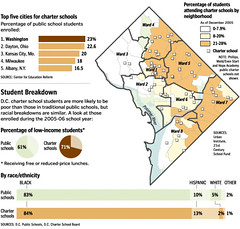(DC) K-12 public education and public involvement and oversight

Postcard, Central (now Cardozo) High School, Washington, DC. Can you imagine the time when people were so proud of their local schools that postcards were made and sold depicting the buildings?
From Lisa Raymond, Vice President, DC State Board of Education, via email:
Last week, I submitted an op-ed to the Washington Post regarding the April 9th article, "Move to Cut Two Budget Hearings Opposed: Advocates Ask Council To Reject Fenty Plan." Unfortunately, it was not published. But I have sent my comments in letter form to each Council member and have attached the language below for your information.
Dear Councilmember:
I am writing to voice my opposition to Mayor Fenty's proposal to the DC City Council to eliminate two school budget hearings that are required by law to be held before submitting the District of Columbia Public Schools' budget to the Council. As the DC Board of Education member elected to represent Wards 5 and 6 and the parent of two DC public school children, I am concerned greatly by this action. I ask that you work with the Mayor, the Chancellor, and the broader DC community to reach a compromise that balances the authority of the Chancellor with the rights of public school parents and other concerned residents to weigh in on this important process.
This proposal, according to an April 9th Washington Post article, "Move to Cut Two Budget Hearings Opposed: Advocates Ask Council To Reject Fenty Plan," is part of an effort to "have the school system treated the same as other city agencies." I appreciate that DCPS is similar to other agencies in that it provides a vital service upon which many of us rely. As a parent, however, I have an enhanced right and obligation to scrutinize the operations of an agency that is responsible for the education and safety of my children for more than 30 hours each week. But I and other parents cannot do that if we cannot see detailed information about what the Mayor is proposing for our schools.
If we are to effectively reform our schools, parents and other community stakeholders must be part of the process. At the same time, we should not place restrictions on the system that will slow operations and prevent policymakers from advancing true reform.
The benefits associated with parent and community engagement are well established. Through the DC State Board of Education, the public has been involved in everything from shaping the District's first-ever health standards to establishing rules for homeschooling, greatly enhancing the quality of our work. Indeed, the federal No Child Left Behind law recognizes this by requiring "adequate opportunity" for parents and teachers to develop and comment on plans to "restructure" chronically low-performing schools—of which DCPS currently counts 27.
The Mayor's proposal provides us with an opportunity to create a new vehicle for community participation, as opposed to defending past practices simply because "that's the way it's been done." I do not believe that we should insist upon hearings just for the sake of hearings, but work to ensure that we are accomplishing our true goal: thoughtful, effective parent engagement that results in higher achievement for our students.
The budget is the blueprint for how the Chancellor will implement her vision and a crucial piece of the school reform puzzle. But as with other efforts, it will be much more successful with relevant, timely input from parents and other stakeholders, including advocates upon whom many of us rely when we lack the time to digest vast amounts of technical information.
The Chancellor has stated that she is willing to seek community input in the budget process. However, without an agreed-upon definition of what information the community will receive, and when, this process is likely to be ineffective and result in continuing frustration on both sides, further hindering DCPS's fight to keep its current students and attract new families. And, unless citizens can view actual line items, promises of new programs, such as art and physical education, ring hollow.
For reform efforts to be successful, we must ensure a transparent process this next budget cycle, with opportunities for full engagement of the community. As an elected representative, I hope that you will ensure that all parents and other concerned residents can participate in a meaningful way.

Charter school enrollment, Washington, DC. By M.K. Cannistra, Todd Lindeman and April Umminger, The Washington Post - August 22, 2006.
Labels: civic engagement, education, government oversight, media, municipal government, provision of government services



0 Comments:
Post a Comment
<< Home